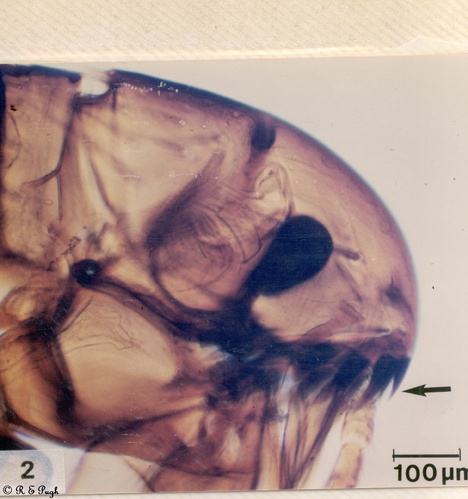Taxonomy: Order Siphonaptera (fleas)
Animal: Ctenocephalides canis 1 01.jpg
Sites: Skin
Comment:
Ctenocephalides canis head -(dog flea) Note the first genal comb which is small compared with that of C. felis felis and the round head compared with the cat flea which has a long pointed head. Ctenocephalides are 1-3 mm long, reddish-brown to black in color, wingless, and are laterally compressed, have eyes, horizontal genal comb, pronotal comb and the mandibles are slender with inconspicuous serrations. Females are slightly larger than males. There are 3 bristles on the metepisternum of C. canis but only 1 or 2 on C.felis felis. There is only one bristle between the postmedian and apical long bristles on the dorsal margin of the hind tibia of C.felis felis compared with 2 bristles in C.canis. C. canis is a very poor host for Dipylidium caninum (unlike C. felis felis and Xenopsylla cheopis) . Although C. felis felis is designated the cat flea and C. canis is called the dog flea, neither is host specific and both live on both cats and dogs and they will also bite humans and many other animals to obtain their blood meals. In Australia, C. felis felis is more common in warmer areas and C. canis is more prevalent in more temperate areas. Identification of flea species is determined by the shape of the head, presence or absence of genal and pronotal combs, eyes, internal rod on the mesothorax, bristles on hindcoxa etc. (see Pugh 1985 PhD thesis; Smart. 1943) see bibliography for details.
First Picture |
Previous Picture |
Next Picture |
Last Picture

